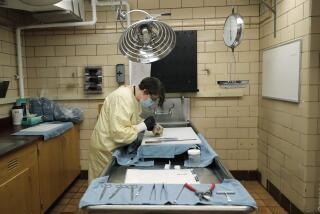New Virus in AIDS Cases to Get More Study
- Share via
Federal scientists plan further research to clarify the significance of a new virus that reportedly is present only in AIDS patients, a government spokesman said Monday.
Dr. Shyh-Ching Lo, a researcher at the Armed Forces Institute of Pathology in Washington, said in a scientific journal last week that he has found the previously unknown microbe in the tissues of 23 out of 24 AIDS patients.
It is not yet clear whether the virus is even implicated in AIDS, but if it is, the discovery may be an important clue to the deadly acquired immune deficiency syndrome.
“We’re in the infant stage of trying to investigate this unknown virus that has been identified,” said Col. William Tuten, an institute spokesman. “It’s going to be a long, hard track to find out whether it’s anything important. . . . I wish there was more that I could say at this point.”
Other researchers were cautious about commenting on Lo’s work, which was published in last week’s issue of the American Journal of Hygiene and Tropical Medicine, a publication not generally read by AIDS investigators.
Several scientists, who asked not to be identified, said they feared that the virus may merely be a contaminant that found its way into the tissues studied by Lo. “All of us have been affected by contaminants in our studies,” one researcher said.
Other scientists advised caution in evaluating the new finding until it has been repeated by other investigators.
“We all must be very cautious about announcing anything new,” said Dr. Flossie Wong-Staal, a National Cancer Institute researcher who is a close collaborator with Dr. Robert Gallo, the American discoverer of the virus that causes AIDS.
But, she said, if the virus is indeed a new one--even if it is not related in any way with causing any of the symptoms of AIDS--the discovery is a “significant one” because the discovery of a new human virus is a rare event.
“And, if on top of that, there is some disease connection, then it indeed is very significant,” she said.
If the new virus is somehow involved in the AIDS process, some observers speculate, it may be a so-called co-factor that must be present, in addition to the AIDS virus, in order to cause Kaposi’s sarcoma, an unusual form of cancer that typically afflicts AIDS patients who are gay.
Initially it was believed that two other viruses, cytomegalovirus and the Epstein-Barr virus, might be co-factors for Kaposi’s.
However, recent epidemiological studies have failed to show them to be directly involved, according to Dr. Ron Mitsuyasu, a UCLA authority on the disease.
More to Read
Sign up for Essential California
The most important California stories and recommendations in your inbox every morning.
You may occasionally receive promotional content from the Los Angeles Times.













